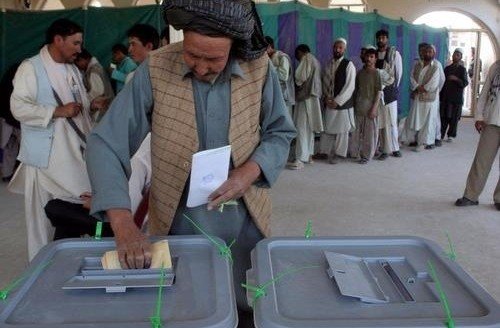
Explosive audio tapes released in Afghanistan allegedly reveal a senior election official directing that ballot boxes be stuffed in the crucial presidential run-off.
The recordings, which cannot be independently verified, are believed to have come from the security services.
They have been placed in the public domain by the Abdullah Abdullah camp who refuse to disclose their source.
Fraud allegations have been made by Dr. Abdullah Abdullah and by his rival Ashraf Ghani.
The audio tapes appear to reveal a partisan senior election official working in Dr. Ashraf Ghani’s interest.
However, the former World Bank executive’s team say secret recordings without a court order are illegal and must be investigated.

The audio tapes appear to capture conversations between a senior election official, Zia Ul-Haq Amarkhail, and colleagues in at least four other provinces.
In an apparent reference to ballot box stuffing, the tapes appear to show Zia Ul-Haq Amarkhail urging a colleague to “bring the sheep stuffed and not empty”. The reference to sheep and goats – ballot boxes and people or votes – is made several times during the recorded exchanges.
In a separate conversation, the senior official also apparently deals with concerns from a colleague in one of the north-western provinces, who warns that “others make the majority in our office”.
Zia Ul-Haq Amarkhail apparently responds to him with the words “why don’t you get rid of them, take a stick and kick them all out” and goes on to suggest new officials are recruited from ethnic groups, assumed to back Ashraf Ghani.
Many awkward questions still surround the release of tapes, copies of which have now been handed to the presidency and the Independent Election Commission (IEC).
The UN, which is being urged by Abdullah Abdullah to step in and help arbitrate disputes, has also been made aware of their existence.
In a statement, the UN said the Afghan election authorities should consider the “validity, weight and implications” of the tapes and “take action in line with the principles of accountability”.
It wants the Afghans to sort out their own problems but do so in a “transparent” manner.
For the past week the IEC has been under pressure to suspend Zia Ul-Haq Amarkhail pending an investigation.
An altercation between him and a senior police official on election day, after the police chief had become suspicious of his movements, was aired on Afghan TV.
Since then the cries for him to be relieved of his duties have grown louder, but so far the election body has resisted taking any action.
The election authorities simply stated that his “privacy” was protected by the constitution when asked for a comment about the tapes.
Many questions arise from these audio recordings. How were they obtained, why are they being released now and will they be admissible as “evidence” of alleged fraud?
The Abdullah Abdullah camp has tossed this explosive material into the public domain but the presidential hopeful himself has been away from the media spotlight – in sharp contrast to his public appearances earlier this week.
He has suspended his co-operation with the election authorities, a position the UN has described as “regrettable” and says he will not recognize any result they release.
More demonstrators from Abdullah Abdullah’s camp have been out on the streets of Kabul on Sunday.
Many say they are there to “protect their vote” from fraud.
Both sides have lodged complaints about the conduct of these elections and for Abdullah Abdullah, who felt he was robbed of the presidency back in 2009, there is a sense that history is repeating itself.